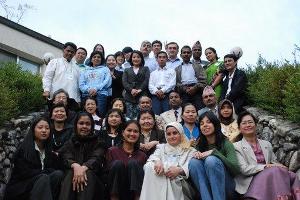|
|
Training Workshop on Educational Policy and Education for International Understanding
un articulo por The Asia-Pacific Centre of Education for International Understanding (APCEIU)
The 7th Asia-Pacific training workshop was held at the UNESCO Peace Center and the International Cooperation Training Center on 1~16 Oct 2007 for the purpose of training EIU [Education for International Understanding] trainers of member states.
Convening 25 educators and educational administrators of 18 countries within and without the region this workshop delivered EIU concepts and themes in an integrative and synthetic mode. Sessions for themes of EIU (cultural diversity, sustainable development, human rights, peace, and globalization) were primarily presented by lectures and moderator through the combination of lecture and activity, and then participants were requested to share local cases and situations that would lead to discussion for reflection or adoption.

click on photo to enlarge
In addition, study visits to KEDI [ Korean Educational Development Institute] and KERIS [Korean Education & Research Information Service] and the visit to a middle school class gave a comprehensive and realistic picture of Korean school system, so that the trainees can have a comparative reflection on their local educational conditions and envision for better policy and system towards a Culture of Peace. All the sharings and reflections were summed up in participants’ presentation of national action plan which was cooperatively drafted by both teachers and educational administrators.
Considering the scope and diversity of participants and the interpersonal, intersectoral, and intercultural interactions sensed throughout the workshop, the training reached closer to its aim than ever before.
Other initiatives for education for international understanding and a culture of peace may be found on the website of APCEIU
|








|
DISCUSSION
Pregunta(s) relacionada(s) al artículo :
How do we promote a human rights, peace based education?,
* * * * *
Comentario más reciente:
:
Question: what is the relation between peace and education?
http://cpnn-world.org/new/?p=4780
We teach the science of war on an even and equal basis with the 3Rs and we maintain it with more resources than any other school. Further, we have done this consistently for a couple of thousand years, long before education was institutionalized for all children. And we have never questioned the wisdom of teaching millions of civilians how to kill while never giving the same credence, or any for that matter, to the science of peace, the study of anti-war, of reconciliation. With this inured mindset leaders choose to fund boot camps and officer training colleges and by omission deprive youth of the better choice.
If we can teach war and violence with such commitment to suit the purposes of generals and the arms trade, where are the rest of us who have a greater need for peace and conciliation than anyone anywhere has for the killing fields? Why have civilians not demanded peace education long ago and why don't we have it now?

|
|









